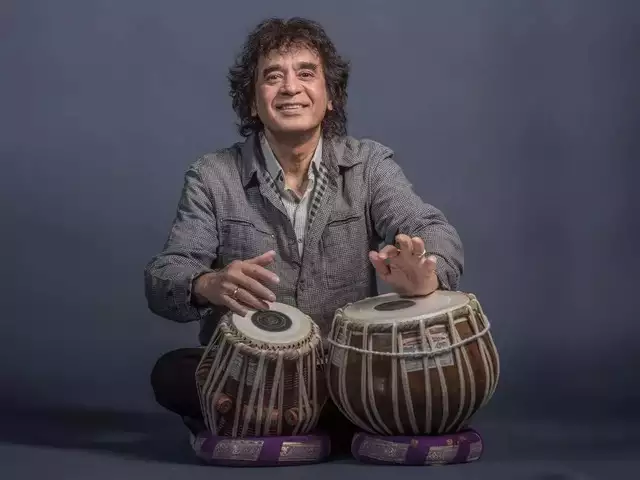Ustad Zakir Hussain, the unparalleled tabla maestro who brought Indian classical music to a global audience, passed away on Sunday at the age of 73 in San Francisco. The cause of death, as confirmed by his family, was idiopathic pulmonary fibrosis, a chronic lung condition.
His passing marks the end of an era in world music, leaving a void that will be hard to fill.
Table of Contents
Early Childhood
Born Zakir Allaraka Qureshi on March 9, 1951, in Bombay (now Mumbai), Zakir Hussain was destined for greatness. His father, the legendary Ustad Alla Rakha, was a renowned tabla virtuoso, and his mother, Bavi Begum, changed his surname to Hussain shortly after his birth on the advice of a Muslim saint.
A child prodigy, Zakir Hussain began performing concerts at just seven years old and was touring internationally by the age of 12. His early mastery of the tabla earned him the honorific “Ustad,” signifying his status as a master artist. Together with his father, Zakir elevated the tabla from a supporting role in Indian classical music to a leading instrument celebrated worldwide.
A Career That Spanned Genres and Continents
Zakir Hussain’s career was a tapestry of collaborations, innovation, and cultural fusion:
- Classical Roots: Zakir Hussain performed alongside Indian legends like Pandit Ravi Shankar and Ustad Vilayat Khan, solidifying his place in the pantheon of Indian classical music.
- Global Collaborations: He worked with global icons, including cellist Yo-Yo Ma, jazz master Charles Lloyd, and even George Harrison of The Beatles.
- Fusion Bands: Zakir co-founded Shakti with guitarist John McLaughlin and Planet Drum with Grateful Dead’s Mickey Hart. The latter collaboration earned him a Grammy Award.
- Grammy Recognition: Over his career, Zakir won four Grammy Awards, including accolades for contemporary instrumental albums and global music performances.
Prestigious Accolades
Zakir Hussain was not only a master musician but also a cultural ambassador. His contributions to music were recognized with numerous awards, including:
- Padma Shri (1988) and Padma Bhushan (2002): Prestigious civilian honors from the Government of India.
- Grammy Awards: Four-time winner across various categories, most recently in early 2024.
- National Endowment for the Arts Fellowship (United States): A testament to his global influence.
In 2009, Zakir performed four sold-out concerts at New York’s Carnegie Hall, showcasing the tabla’s emotive power to audiences worldwide.
Tributes Pour In
Ustad Zakir Hussain’s passing has prompted an outpouring of grief and tributes from across the globe. From artists to political leaders, many have expressed their admiration and sorrow.
Indian Rajya Sabha member Sudha Murty spoke to ANI, saying:
“Hearing of Zakir Hussain’s death brings me immense pain. He introduced the beauty of the tabla to the Western world. He was a good human being, and I knew him personally. It is a great loss to India and the music world.”
A Family Legacy
Zakir Hussain is survived by his wife, Antonia Minnecola; his daughters, Anisa Qureshi and Isabella Qureshi; his brothers, Taufiq Qureshi and Fazal Qureshi, both accomplished tabla players; and his sister, Khurshid Aulia.
A Legacy That Transcends Borders
Zakir Hussain’s career, spanning nearly six decades, revolutionized how the world perceives Indian classical music. Renowned for his unparalleled virtuosity, improvisational genius, and ability to bridge cultural divides, he made the tabla an instrument of global significance.
His extraordinary life and music will continue to inspire generations of musicians and music lovers. The world has lost not just a virtuoso but a true cultural ambassador whose impact will resonate far beyond his years.
Rest in peace, Ustad Zakir Hussain. Your rhythms will echo eternally.




